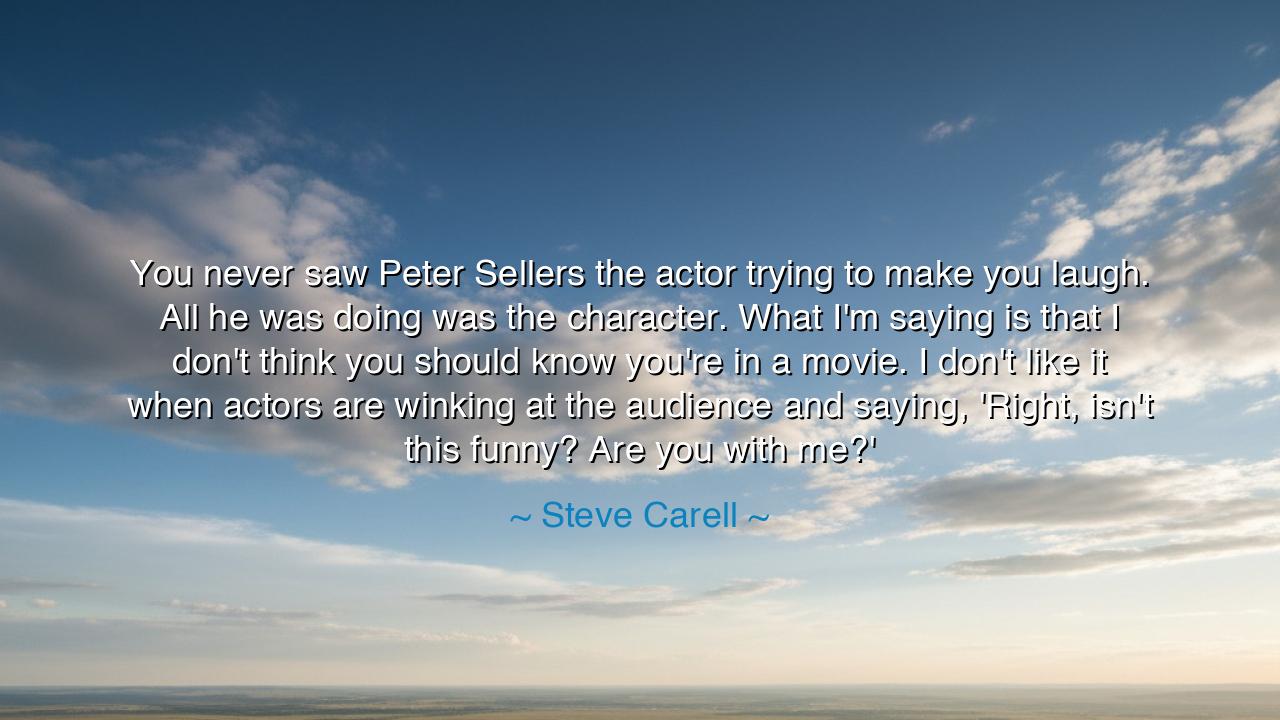
You never saw Peter Sellers the actor trying to make you laugh.
You never saw Peter Sellers the actor trying to make you laugh. All he was doing was the character. What I'm saying is that I don't think you should know you're in a movie. I don't like it when actors are winking at the audience and saying, 'Right, isn't this funny? Are you with me?'






When Steve Carell said, “You never saw Peter Sellers the actor trying to make you laugh. All he was doing was the character. What I'm saying is that I don't think you should know you're in a movie. I don't like it when actors are winking at the audience and saying, ‘Right, isn't this funny? Are you with me?’” he spoke as both artist and philosopher. His words are not simply about performance — they are about truth, about the purity of creation, and the sacred duty of the artist to serve the story rather than himself. In this reflection, Carell honors authenticity over artifice, reminding us that greatness in art, and indeed in life, comes when one disappears into purpose, when ego dissolves, and only truth remains.
The origin of his insight lies in his reverence for Peter Sellers, the legendary English actor whose genius was rooted in transformation. Sellers did not perform — he became. Whether he was the bumbling Inspector Clouseau or the coldly calculating Dr. Strangelove, the man himself vanished behind the mask of the character. He never sought laughter for his own sake; he sought truth, and laughter followed naturally. This is what Carell means when he says Sellers wasn’t “trying to make you laugh.” The humor, the emotion, the brilliance — these were the fruits of honesty. Carell, who built his own reputation as a master of subtlety and restraint, speaks here not of technique but of philosophy: do not perform life — live it.
To understand his meaning more deeply, one must remember that theatre, in its earliest form, was not a game of pretense but a sacred ritual. The Greeks believed that when the actor stepped onto the stage, he became a vessel for the gods. The audience was not watching a man pretending to be Oedipus or Antigone — they were witnessing the divine essence of human experience revealed through him. The moment an actor became self-conscious, the illusion shattered, and the sacred was lost. Carell’s words echo this ancient wisdom: when the performer “winks” at the audience, when he seeks approval rather than revelation, he breaks the spell. The story dies, and only vanity remains.
There is also a deeper truth here about humility. Carell’s disdain for self-aware performance is a rejection of ego — that ever-hungry force that seeks recognition and applause. The great artist, like the great leader or teacher, must efface himself so that truth may speak through him. In this, Carell’s philosophy mirrors that of Michelangelo, who said he did not carve statues but released them from the marble. Likewise, the actor does not “create” the character; he unveils it, removes his own artifice until what remains is pure and alive. When Peter Sellers played a fool, we did not see a man acting; we saw folly itself, stripped of pretense. Such purity is what Carell aspires to — not merely as a performer, but as a human being striving for authenticity in an age of performance.
Yet Carell’s observation carries weight beyond the stage and the screen. In the theatre of life, too, there are those who “wink at the audience” — who live not from sincerity but from performance. They seek validation, laughter, and applause instead of genuine experience. But the wise understand that true connection, whether in art or in love, is born only of presence. To live as Sellers acted is to inhabit every moment fully — to lose the self-consciousness that separates us from reality. The teacher who teaches for glory, the friend who speaks to impress, the lover who loves to be admired — all are performers who have forgotten the sacred simplicity of being.
Consider, for example, the story of Buster Keaton, another great figure of comedy’s silent age. Like Sellers, Keaton never winked at his audience. In his films, chaos erupted around him, yet he remained stoic, sincere, utterly absorbed in the logic of his world. His deadpan face made the laughter all the louder, for it was the laughter of recognition — of truth unembellished. His commitment to honesty in performance made him immortal. So it is with all who dedicate themselves wholly to their craft: they do not seek to charm; they seek to reveal. And in doing so, they achieve something far greater than applause — they achieve timelessness.
So, my children, take this teaching into your heart: do not perform — embody. Whatever you do, do it with the full weight of your soul. When you speak, speak truly. When you love, love wholly. When you create, vanish into the creation. Do not wink at the world or beg it to notice you; rather, let your sincerity command its attention. The laughter, the admiration, the recognition — these will come of their own accord, as they came to Sellers, to Keaton, to Carell himself. For the world hungers not for cleverness, but for truth.
Thus, let Carell’s words be a compass for all who strive toward excellence: whether in art, in work, or in life, the highest form of mastery is invisibility — the vanishing of the self in service to the greater whole. When you cease to prove and begin to be, your life itself becomes art, your every action a reflection of something eternal. And then, like the masters before you, you will need no applause, for the truth you embody will speak for itself.






AAdministratorAdministrator
Welcome, honored guests. Please leave a comment, we will respond soon